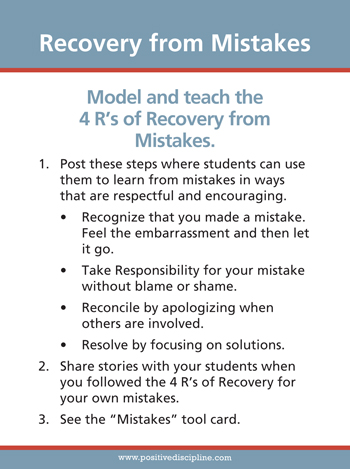by Jane Nelsen and Kelly Gfroerer, co-authors of Positive Discipline Tools for Teachers Book and Cards
Rudolf Dreikurs shared “Making mistakes is human. Regard your mistakes as inevitable instead of feeling guilty, and you’ll learn better.” Dreikurs’ perspective is supported by current day research. For example, Carol Dweck has found that students who perceive mistakes as opportunities to learn are more successful compared to students who avoid difficult tasks for fear of making mistakes. Dweck points out that students who are taught to embrace mistakes as opportunities develop strategies that lead to greater academic and personal success.
In a Positive Discipline classroom mistakes are viewed as opportunities to learn. Students are encouraged to focus on solutions. And, when a mistake involves hurt feelings, students (and teachers) are encouraged to use the 4 R’s of Recovery From Mistakes.
One teacher recently shared a story about how a student in her class used these steps. The student had frequent power struggles with school staff in the lunch room and on the playground. The student asked to go get a drink of water from the water fountain as the students were going from lunch to the playground. The lunch staff asked the student to wait. He went anyway. Of course, when students were being counted someone was missing, and the staff was immediately panicked. When the student showed up on the playground after getting water, the staff was upset and told him so. After the student calmed down, his homeroom teacher made a connection with him by validating his feelings about being thirsty, and then asked if he could imagine how the staff felt when they couldn’t find him. He realized that what he did caused everyone to be worried and concerned, and decided to use the 4 Steps for Recovery from Mistakes.
- First, with the help of his homeroom teacher he was able to recognize that he made a mistake. He talked with her about how embarrassed he was when he came back from getting water and everyone was upset and looking for him.
- Next the student took responsibility for his mistake and wrote a letter to the lunch and playground staff.
- He then went to the lunchroom staff person who had told him to wait to get water. He apologized for not following the rules and for being unkind when he returned to the playground .
- He resolved the problem by letting these two adults know that he understood what he did caused them to worry, and that he would follow the rules in the future.
In this case, a student used the 4 R’s of Recovery from Mistakes. This is a tool that can also be used by teachers. When you make a mistake with your students, it gives you the opportunity to model the 4 Rs. We all know how forgiving students are when adults apologize. They are then in a frame of mind to focus on solutions.
Click Here to read more about Carol Dweck’s research.


No Comments yet!